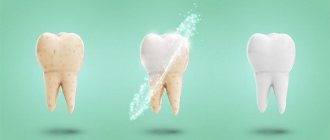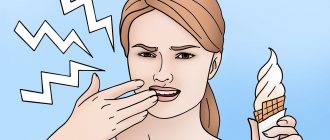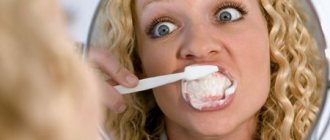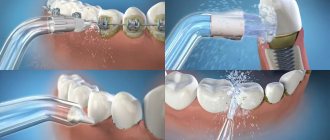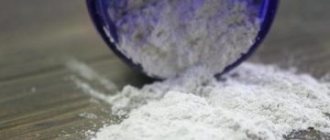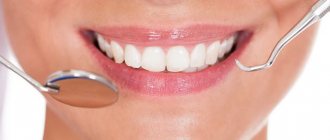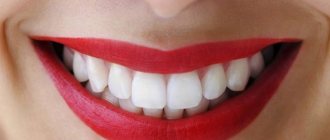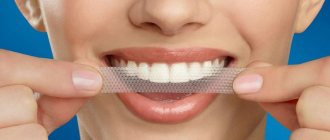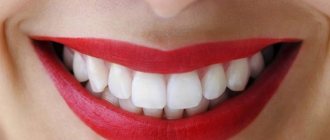A beautiful, white smile and an even row of teeth make your interlocutor feel better and attracts glances. All this cannot be achieved if you do not monitor the health of your teeth and oral cavity. Modern medicine offers patients a range of services to restore the beauty of their teeth, including fluoridation.
Fluoride is a natural substance that is also found in many components, including water. This product is actively added to toothpastes and various products for cleaning the oral cavity and preventing diseases.
In this article we will look at what fluoridation is and the effects of fluoride on teeth.
What is fluoridation?
Fluoridation is a way to strengthen tooth enamel, give it a more attractive appearance and protect it from caries. The procedure involves the use of special products, for example, varnishes, foams or gels, in which the amount of fluoride is much higher than in regular toothpastes.
Fluorine and fluorides
Fluorine in its pure form is a yellowish gas with a characteristic pungent odor. It is poisonous, so it should be used with extreme caution in domestic conditions. Among all the elements of the periodic table, it is one of the most chemically active. Compounds of fluorine with other substances are called fluorides: there are a huge number of them, so their areas of application are also very extensive. This includes dentistry. The first pastes containing fluoride appeared at the beginning of the twentieth century, and in the late 1940s, an experimental program for water fluoridation began in the United States, which brought mainly positive results in the fight against caries. After some time, several dental associations of the leading countries of the world recognized fluoridated toothpastes as an effective preventive measure. At the same time, the number of opponents of fluoride increased, including quite well-known specialists.
Attention!
Toothpastes and other oral care products use fluoride rather than fluoride itself.
Dentists' tips for caring for your teeth after a comprehensive cleaning
It is in the patient’s interests that the effect of the complex of procedures lasts as long as possible. Therefore, it is important to follow the following recommendations from your dentist in the first few days:
- do not eat or drink for 2 hours after visiting the dentist;
- You should brush your teeth for 3–5 minutes after each meal and at night;
- possible increase in enamel sensitivity. Do not consume food or drinks that are too hot or too cold;
- try not to smoke, tobacco tars eat into the enamel very quickly;
- Reduce (or eliminate) from your diet foods and drinks that contain high amounts of natural and artificial coloring substances.
The dental network offers comprehensive teeth cleaning services. Our clinic offers family and savings discounts. Doctors are highly qualified and improve their skills in leading dental clinics in Russia and Europe. The level of services provided meets international standards.
Branches of our orthodontic center are located in Moscow within walking distance from the metro:
- Art. Alekseevskaya (VDNKh district, etc. Mira), address: st. 3rd Mytishchiskaya house 3, building 2;
- Art. Shelepikha, address: Shelepikhinskaya embankment, address: building 34, building 1.
We will make your teeth strong, beautiful and healthy! Come and see for yourself.
Why do they argue about the benefits and harms of fluoride?
The main reason for the controversy is the properties of fluorine and compounds based on it. Let's start with the fact that without a minimum amount of this substance in the body, the normal development of not only teeth, but also nails, hair and skeletal bones as a whole is impossible. Fluorides are found in most foods and even the earth's crust, so we get some portions of it anyway. Most experts and scientists agree that for an adult the daily fluoride intake should be 3-5 mg, and for children - from 0.5 to 2 mg (depending on age). The deficiency leads to accelerated demineralization of enamel and the formation of caries, osteoporosis and other problems that go far beyond the oral cavity.
On the other hand, a few grams of fluoride in its pure form are considered fatal to humans, and a regular overdose can cause problems with bones and joints, liver, heart, respiratory system and provoke a number of diseases. Most dental patients are interested in the harm of fluoride to teeth when using special toothpaste and drinking fluoridated water. It so happens that they are the ones who most often become the subject of the most heated debates and the basis for the emergence of myths and prejudices.
Fluorides in food
Why strengthen baby teeth if they are about to fall out?
“Many parents, unfortunately, think so,” complains Dr. Korostelev. - But you also need to take care of baby teeth. If you lose a baby tooth early, you may have problems with your bite in the future. Also, if a baby tooth has an inflammatory process, this can be transmitted to the permanent tooth, to the follicle of the permanent tooth. This can lead to serious problems, including loss."
Therefore, it is necessary to carry out fluoridation of baby teeth, as well as to strengthen them.
The benefits and harms of fluoride in toothpaste
You need to understand that fluorine in this case is a generalized concept. For example, toothpaste does not contain fluoride itself in its primary state, but compounds based on it. Most often it contains the following types of fluorides:
- Sodium monofluorophosphate
is practically absent in modern pastes due to the slow release of fluoride ions. - Sodium fluoride
is a very popular component, which is characterized by fast action and good remineralizing properties. By the way, most opponents of fluoridation talk about the harm specifically from sodium fluoride. - Stann fluoride
is another fairly common ingredient used by several major toothpaste manufacturers. - Aminofluoride
is considered the most modern, effective and expensive type of fluoride in oral care products.
Conversations about the benefits and harms of fluoride in toothpaste have been going on for a long time. However, in reality, many theses are unverified or overly exaggerated. Below is a table showing the objective positive and negative qualities of fluoridated toothpaste.
- Fluoridated toothpaste prevents (partly!) demineralization of enamel and the development of caries. Oral bacteria produce lactic acid, which lowers pH levels and “leaches” calcium from tooth enamel, leaving it vulnerable. When exposed to fluoride, calcium crystals form a strong compound that is less susceptible to acid attack.
- Fluorides have antiseptic properties, preventing the growth of bacteria and the formation of plaque, and also positively affecting the composition and protective properties of saliva.
- Excess fluoride provokes fluorosis - a disease of the enamel with the appearance of characteristic spots and depressions. The risk of its occurrence is especially high in childhood during the development of baby teeth. However, fluoridated toothpaste alone can rarely become the main cause of excess fluoride in the body.
- Fluoride can negatively affect the saprophytic (friendly) microflora of the oral cavity. This is one of the modern theses from experts who talk about the harm of fluorides in toothpaste.
Fluoride in water - benefits and harms
When we talk about the benefits and harms of fluoride for teeth and the body as a whole, we must not forget about fluoridated water.
According to many experts, it is this that can most effectively restore the lack of substances in the body. On the other hand, fluoride is one of the most difficult elements to remove, and drinking fluoridated water contributes to its accumulation. Modern research suggests that if a liter of water contains more than 1 mg of fluoride, it can potentially be dangerous to the body. In past years, especially at the beginning of experiments with fluoridation, the dosage could be much more severe, causing different reactions in some people.
Many fluoridation opponents argue that in the 1950s, American courts were inundated with fluoride poisoning lawsuits. Be that as it may, the fact remains: today, water fluoridation is carried out in many countries and regions. The harm of fluorine in water is most often discussed when its increased concentration is detected or when toxic compounds are used, in particular fluoroaluminates.
The benefits and harms of fluoride for humans: the most radical theses for and against
| BEHIND | AGAINST |
|
|
CURAPROX enzycal 1450
JASON Powersmile "Peppermint"
Miradent® Mirasensitive hap+ toothpaste
All products can be purchased at.
Alternative to fluoride
The harm or benefit of fluoride in toothpaste is a largely debatable issue.
Using fluoride toothpaste is possible, and in some cases even recommended. On the other hand, this is not a compulsory measure or a panacea. But the mark on the tube “Fluoride free!” — may well turn out to be a product of marketing. Although there are compounds and components that are an alternative in the prevention of caries and demineralization. Firstly, these are toothpastes with glycerophosphate and calcium hydroxyapatite, which saturate the enamel and resist the effects of acid. Probiotics in toothpastes help maintain optimal oral microflora, and diet and special rinsing solutions will help control pH levels. Natural plant ingredients also help achieve an antibacterial effect. Publisher: Expert magazine about dentistry Startsmile.ru
Author of the material: Yaroslav Ikonnikov
Deep fluoridation of teeth in Krasnodar
You can perform deep fluoridation in Krasnodar in our dentistry for the whole family “Orthodontics”. The clinic has all the necessary equipment and medications to perform the deep fluoridation procedure. You can view the prices on our website by going to the price list section.
Return to list of services

